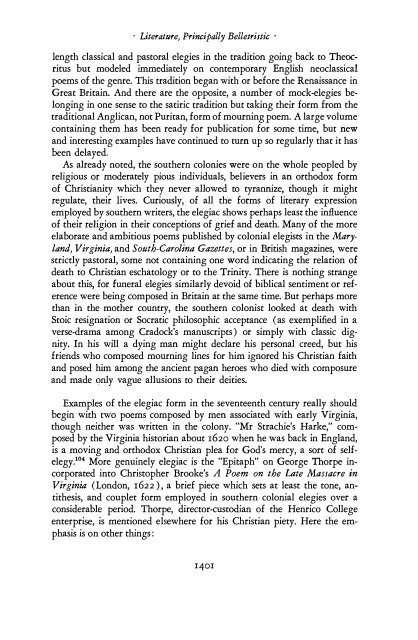Literature, Principally Belletristic - University of Tennessee, Knoxville
Literature, Principally Belletristic - University of Tennessee, Knoxville
Literature, Principally Belletristic - University of Tennessee, Knoxville
You also want an ePaper? Increase the reach of your titles
YUMPU automatically turns print PDFs into web optimized ePapers that Google loves.
· <strong>Literature</strong>,<br />
<strong>Principally</strong> <strong>Belletristic</strong> .<br />
length classical and pastoral elegies in the tradition going back to Theocritus<br />
but modeled immediately on contemporary English neoclassical<br />
poems <strong>of</strong> the genre. This tradition began with or before the Renaissance in<br />
Great Britain. And there are the opposite, a number <strong>of</strong> mock-elegies be<br />
longing in one sense to the satiric tradition but taking their form from the<br />
traditional Anglican, not Puritan, form <strong>of</strong> mourning poem. A large volume<br />
containing them has been ready for publication for some time, but new<br />
and interesting examples have continued to turn up so regularly that it has<br />
been delayed.<br />
As already noted, the southern colonies were on the whole peopled by<br />
religious or moderately pious individuals, believers in an orthodox form<br />
<strong>of</strong> Christianity which they never allowed to tyrannize, though it might<br />
regulate, their lives. Curiously, <strong>of</strong> all the forms <strong>of</strong> literary expression<br />
employed by southern writers, the elegiac shows perhaps least the influence<br />
<strong>of</strong> their religion in their conceptions <strong>of</strong> grief and death. Many <strong>of</strong> the more<br />
elaborate and ambitious poems published by colonial elegists in the Mary<br />
land, Virginia, and South-Carolina Gazettes, or in British magazines, were<br />
strictly pastoral, some not containing one word indicating the relation <strong>of</strong><br />
death to Christian eschatology or to the Trinity. There is nothing strange<br />
about this, for funeral elegies similarly devoid <strong>of</strong> biblical sentiment or ref<br />
erence were being composed in Britain at the same time. But perhaps more<br />
than in the mother country, the southern colonist looked at death with<br />
Stoic resignation or Socratic philosophic acceptance (as exemplified in a<br />
verse-drama among Cradock's manuscripts ) or simply with classic dig<br />
nity. In his will a dying man might declare his personal creed, but his<br />
friends who composed mourning lines for him ignored his Christian faith<br />
and posed him among the ancient pagan heroes who died with composure<br />
and made only vague allusions to their deities.<br />
Examples <strong>of</strong> the elegiac form in the seventeenth century really should<br />
begin with two poems composed by men associated with early Virginia,<br />
though neither was written in the colony. "Mr Strachie's Harke," composed<br />
by the Virginia historian about 1620 when he was back in England,<br />
is a moving and orthodox Christian plea for God's mercy, a sort <strong>of</strong> selfelegy.l04<br />
More genuinely elegiac is the "Epitaph" on George Thorpe incorporated<br />
into Christopher Brooke's A Poem on the Late Massacre in<br />
Virginia (London, 1622), a brief piece which sets at least the tone, an<br />
tithesis, and couplet form employed in southern colonial elegies over a<br />
considerable period. Thorpe, director-custodian <strong>of</strong> the Henrico College<br />
enterprise, is mentioned elsewhere for his Christian piety. Here the em<br />
phasis is on other things :<br />
I40I















